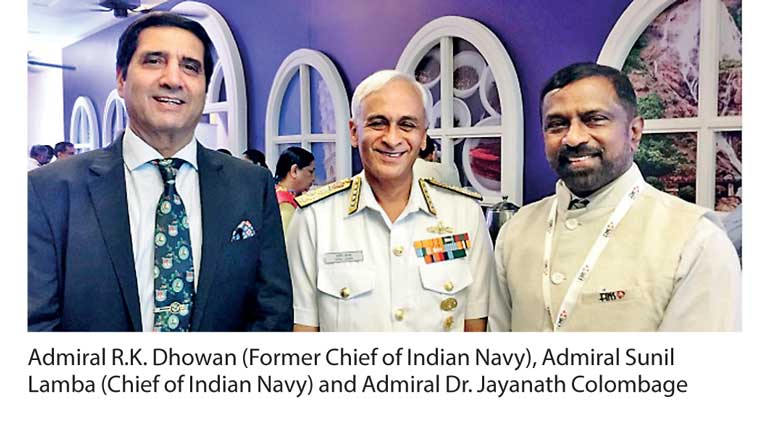Tuesday Feb 17, 2026
Tuesday Feb 17, 2026
Wednesday, 18 October 2017 00:00 - - {{hitsCtrl.values.hits}}

 The first ever track 1.5 discourse on the Indian Government’s ambitious initiative Security and Growth for All in the Region (SAGAR) was conducted in the port city of Goa, India last weekend. This event was organised by Forum for Integrated National Security (FINS) in association with Ministry of External Affairs, Government of India. The think tank partner for this discourse was National Maritime Foundation (NMF) based in New Delhi.
The first ever track 1.5 discourse on the Indian Government’s ambitious initiative Security and Growth for All in the Region (SAGAR) was conducted in the port city of Goa, India last weekend. This event was organised by Forum for Integrated National Security (FINS) in association with Ministry of External Affairs, Government of India. The think tank partner for this discourse was National Maritime Foundation (NMF) based in New Delhi.
Admiral Dr. Jayanath Colombage representing Sri Lanka and Pathfinder Foundation in this ‘Sagar Discourse 2017’, a three-day conference, Norway was the partner country for the event.
The chief guest of the inauguration ceremony was M.J. Akbar, the Minister of State for External Affairs, Government of India. The chief minister of Goa, Honorable Manohar Parikkar was the guest of honour. The chief guest for the second day was Nitin Gadkari, Minister of Road Transport, Highways and Shipping, Government of India. Maritime security and trade experts, international maritime law experts, maritime historians, scientists and many other scholars from 22 countries representing governments, navies, coast guards, maritime industry, academic institutes participated in the grand event. Admiral D.K. Dhowan and Admiral Arun Prakash, former chiefs of the Indian Navy and present chief Admiral Sunil Lanba too shared their wisdom on ocean governance and the need for better coordination in overcoming ‘maritime blindness’ and the key role being played by India in this endeavours.
Three technical sessions were conducted in the discourse namely; ocean and trade, ocean resource management governance at sea and together with one special session on science and technological developments in ocean domain. Admiral Dr. Jayanath Colombage representing Sri Lanka and Pathfinder Foundation presented his research findings on the topic, ‘Challenges and Opportunities for Ocean Management’. Admiral Colombage elaborated on ocean resources in the Indian Ocean Region with special focus on opportunities for sustainable exploration of living and non-living resources from the ocean. Admiral highlighted the importance of ocean as a medium for navigation, source of protein, and balancing the land ecosystem. He emphasised on the impact of man-made pollution of the oceans by oil and gas industry, dumping of plastic, illegal, unregulated and unreported fishing, dumping of toxic waste and radioactive materials and untreated sewage in to the ocean. Admiral Colombage discussed the negative impact of man-made pollution of the ocean in contributing to extreme weather patterns, destruction of marine ecosystems and depletion of fisheries including migration. He also highlighted the impact of noise pollution and ‘acoustic bleaching’ by ships and seismic explosions used for ocean explorations and the resulted influence of marine mammals, who depend on sound signals for migration and to finding food. He further state that as much as 40% of world oceans are heavily affected by human activities and impacted on the coastal populations heavily, including losing of coastal habitats.
Admiral also state the need to maintain a required level of maritime security and a rule based maritime order in the India Ocean region and the need for collaborated and combined efforts by all stake holders from governments and private sector in achieving the same. Admiral Colombage concluded his paper by presenting recommendations for management of Indian Ocean carrying forward the United Nations resolution 70/1, goal number 14, ‘life below water’ in order to utilise the oceans in a sustainable manner. Admiral suggested declaring even limited marine and coastal areas as marine reserves with a view to protect these and allow marine ecosystems to regrow. Admiral Colombage concluded his paper by recommending Indian Governments SAGAR initiative together with FINS to create a panel of experts to study the aspects regarding ocean governance further and to come up with a set of recommendations in support of Indian Ocean Rim Association (IORA) initiatives in sustainable exploitation of oceans.